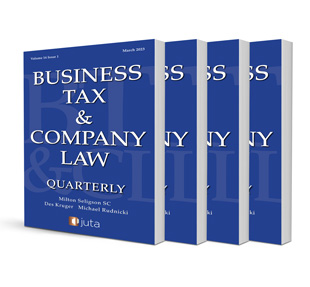
Outsourcing and the Foreign Business Establishment Rule for CFC Purposes: Why The SCA Got it Wrong in CSARS v Coronation Investment Management SA (Pty) Ltd
Authors: Wally Horak and James Mckinnell
ISSN: 2219-1585
Affiliations: Head of Tax, Cape Town, Bowmans; Head of Litigation, Cape Town, Bowmans
Source: Business Tax & Company Law Quarterly, Volume 14 Issue 1, 2023, p. 13 – 23
Abstract
The judgment recently delivered by the Supreme Court of Appeal in the case of CSARS v Coronation Investment Management SA (Pty) Ltd, has caused significant uncertainty and concern amongst South African multinational enterprises which operate via subsidiaries in foreign countries. The judgment had to consider the requirements under section 9D of the Income Tax Act 58 of 1962 to qualify for the foreign business establishment (FBE) exemption from the controlled foreign company (CFC) rules, which may result in the imposition of South African normal tax on the South African parent company (‘Coronation SA’) of an amount equal to the net income of the CFC. In particular, the question was whether the CFC (‘Coronation Ireland’) may determine the scope of its primary business conducted in the foreign country or whether objective factors determine the potential scope of such business. The SCA considered the question with reference to the CFC’s Memorandum of Association and its business licence and concluded that the CFC was entitled to conduct the wider business of fund management and investment management and the fact that it decided to outsource its investment management functions implied that it did not conduct its primary business via the FBE in Ireland. Therefore, the SCA rejected the notion that the primary business is determined with reference to how the CFC chooses to operate, i e the choice of a business model cannot alter the primary operations of the CFC. The SCA thus held that the CFC did not qualify for the FBE exemption. With respect to the imposition of an understatement penalty and under-estimation of provisional tax penalty, the SCA found that the taxpayer relied on a legal opinion that it was entitled to the FBE exemption and there is nothing to suggest that the taxpayer’s tax returns were not submitted in the bona fide belief that it may be eligible for the FBE exemption. Therefore, the Court ruled that the claim for understatement penalties and under-estimation penalties must fail.